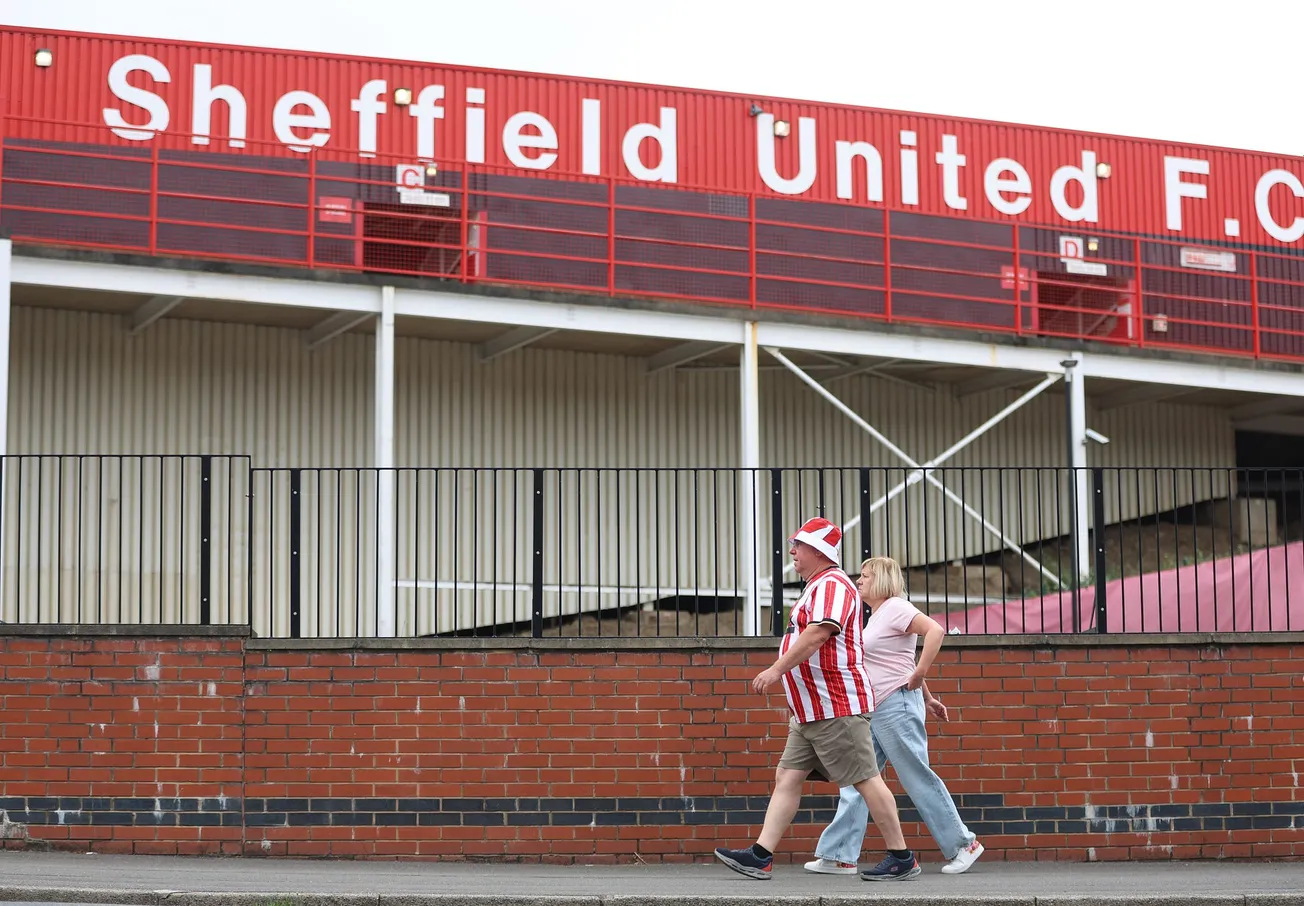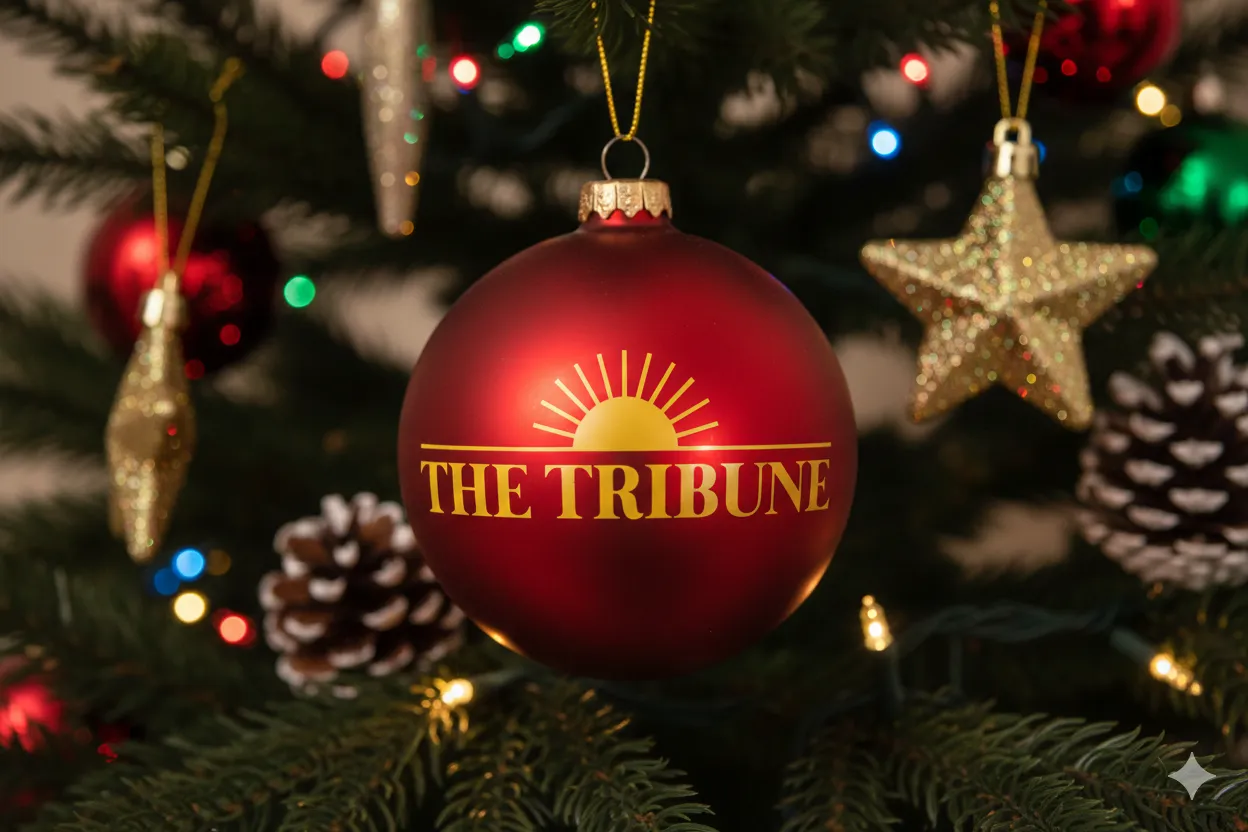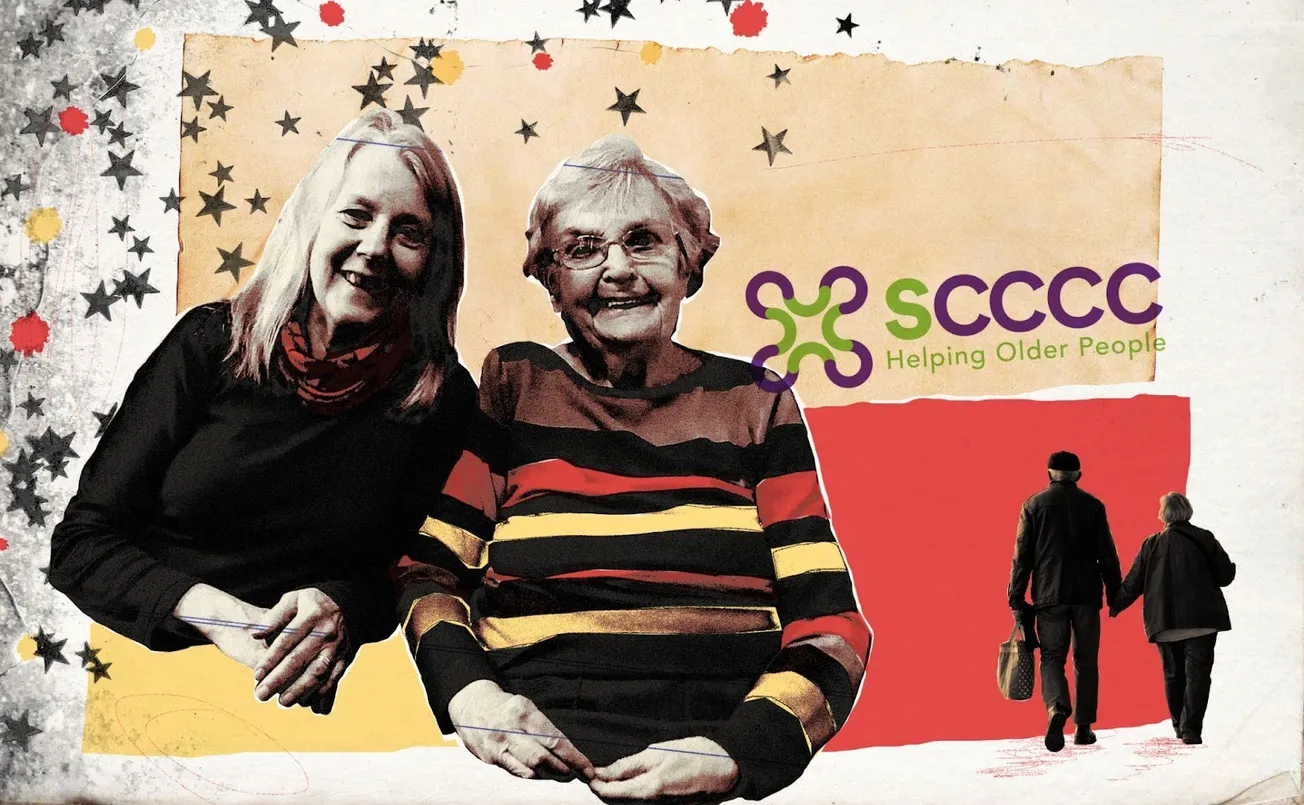At last Saturday’s game against Derby County, my first at Bramall Lane, the history and tradition of the football club is front and centre. Just before kick off, the stadium announcer welcome fans to the “most historic sport stadium in the world” before cueing up the game’s “best anthem”. Most football clubs have a favourite song, but few can have one as earthy and resonant as Sheffield United. Sung to the tune of Annie’s Song by John Denver, Greasy Chip Butty has been copied by many other clubs but is synonymous with the Blades. In the changed song lyrics, United are compared to a gallon of Magnet, a packet of Woodbines, a good pinch of snuff, and, of course, a greasy chip butty. Before the game, a fan tells me the hairs will stand up on the back of my neck when fans start singing it. He was right.
Despite living less than half a mile from the ground, I’ve never been to watch Sheffield United. Why am I coming now? Well, not for the first time in recent years, the club finds itself in the news about a potential takeover. The current owner, Abdullah bin Mosaad bin Abdul Aziz Al Saud (a member of the Saudi royal family, commonly referred to as plain old Prince Abdullah), wants to sell. But it seems that the prospective new owners, a US consortium of investors, are either getting cold feet over whether to buy or are being stopped from doing so by the football authorities. The months-long impasse has left the club in a strange sort of limbo — unable to make a clean break with the past, or plan for the future. What does the club’s third change in ownership in the space of 11 years mean for a club so integral to its community? And could being touted around the boardrooms of the United States rob it of the thing that makes it special?
As I make the short trip from Park Hill to Bramall Lane, it’s a warm 19 degrees; a last blast of summer before the colder and darker autumn nights draw in. On my way down Shrewsbury Road I bump into Keith Proverbs and Ian Walker, two best friends who have been coming to Bramall Lane for the best part of 60 years. They admit to both being excited about the prospect of the takeover bringing more money into the club, but say they have become disillusioned by the contradictory reports coming out via the media. “Another one came out this morning saying it was going through again,” says Ian. “We’re totally in the dark.”

Standing outside the Fan Zone at the junction of Shoreham Street and Cherry Street, Paul Brewster tells me he was born in Sheffield but left when he was just two years old. However, the family attachment to the club was so strong that when it came to deciding where he went to university, the only option was Sheffield. He now lives in Cheshire, but like all other fans, has been following the twists and turns of the takeover like a hawk. But he’s not really optimistic about the sale going through. “I see what people put on all the Facebook groups and it's not looking great,” he says. “I don’t think it’s going to happen.”
Would fans be happy if it did, I ask. “I'd be happy to have an owner who would put a bit of money behind us, but we are just in limbo,” he says. In 2013, Prince Abdullah was brought in by previous owner Kevin McCabe because he was believed to be “loaded”. However, when this turned out not to be true, it led to the pair falling out and McCabe losing control of the club. And this lack of money has now begun to cost Sheffield United, with the club being deducted two points for this season after they broke EFL rules by defaulting on payments to other clubs when they got promoted the season before last. Brewster is glad the turmoil hasn’t so far affected manager Chris Wilder or the players, but he acknowledges that it would be nice for the club to have some financial stability after over a decade of upheaval. “The money just hasn’t been there,” he says. “On Facebook people call him the ‘Tinpot Prince’.”
Five years ago, when I was a reporter on The Star, I attended the trial at the High Court in London when Prince Abdullah and Kevin McCabe went head to head over the ownership of the club. To be honest, the whole thing was a bizarre experience. To see a northern football club fought over by people with incredibly posh accents wearing ridiculous wigs felt very strange indeed. And it got weirder. After it was revealed in court that Prince Abdullah had got a loan for the club from the Saudi Bin-Laden family, the news briefly trended on Twitter and was followed by fan made mock-ups of the Bin-Laden family’s infamous scion Osama in a Sheffield United shirt. When the 20-day long trial was completed, Prince Abdullah was declared the winner. Many were shocked by the result, but I wasn't that surprised. To my untrained eye, I think the Prince had simply paid for a better lawyer.

Just five years later and the club is once again in the grip of an ownership struggle, albeit not one being fought in the High Court. Over the last few weeks and months, the local media has been full of claim and counterclaim. Read Blades reporter Danny Hall in The Star and it seems as if the takeover is in serious trouble. But turn on BBC Radio Sheffield and sports reporters Rob Staton and Andy Giddings seem to be more confident it will take place after all. Faced with conflicting reports, fans are getting understandably confused and frustrated.
Sam Parry, from the Sheffield United newsletter The Pinch and fanzine Dem Blades, says they were so sure the takeover was going to take place that they recorded a podcast about it which has never seen the light of day. His current understanding from secondhand sources is that a deal had been agreed with the EFL but the biggest investor from the US consortium pulled out at the last minute. “Around deadline day it was all signed,” he says. “I don’t know if they have been given an extension. There has also been a suggestion that the Prince might retain a stake, but he isn’t in the new owners’ good books anymore. I think it is quite likely to have fallen through.”
Parry agrees with Ian and Keith that communication from the Prince has been very poor. But equally, the US consortium is so shrouded in mystery that it’s difficult for fans to know exactly what they would be getting if the deal does go through. “They don’t seem to have any kind of sporting track record or the operational experience to run a football club that could be back in the Premier League next season,” says Parry. “Fans are concerned about the Prince continuing but are equally concerned about the potential new owners.”

And the takeover rumbling on is stopping the club moving forward. Parry says it is common knowledge that several signings were made this summer because of the new owners. The US consortium are believed to want to sign younger players and sell them on for a markup, whereas the Prince and manager Chris Wilder want to sign more experienced players. Bournemouth’s former chief scout Des Taylor is also currently working with the new owners but was recently warned by the FA he mustn't have anything to do with transfers until the sale goes through. Understandably, this has led to confusion when it comes to which players the club wants and needs. Sam Parry says the club now has three left backs.
Looking for an independent voice, I try Kieran Maguire from the Price of Football podcast, who is widely regarded as the most authoritative voice on football finance in the UK. He hasn’t got an inside steer on what’s going on at Bramall Lane other than it's clear the current owner wants out. “There are so many rumours and counter rumours that it’s better not to say anything if you don't want to look foolish,” he says. “It is all being kept under very close control.”
But more generally, I wanted to speak to him about why US ownership is so prevalent at the moment. Not long ago, putting money into a football club was a surefire way of losing it very quickly. “There are currently an awful lot of people with money who are prepared to waste it,” says Maguire. But while these people might be prepared to waste it, they also hope that they will be one of the few who do manage to make money. Liverpool owners Fenway Sports Group bought the club for £300 million in 2010 and sold just 10% of it for around £559 million 11 years later. And the US-based Glazer family who since 2005 have owned Manchester United continue to take a lot of money out of the Old Trafford club, much to the annoyance of their fans.

The US economy has also done well in the last few years and English football clubs are the flavour of the month. An American Football NFL “franchise” can cost up to £5 billion, while English football teams are cheap by comparison. There is also a widespread belief in the US that ticket prices and broadcasting rights for English football are too low. As a result, Kieran Maguire believes that while there may be individual successes, the current rush for English football clubs will ultimately not be good news for fans. “If all these new owners were to get together and say we are not charging enough for tickets, there could be a significant rise in prices,” he says. “If you are selling out at £50 a ticket, why not increase it to £70 a ticket? They think they know more about soccer than we know about football.”
These US investors have also seen the astonishing success of Wrexham, which was bought by Hollywood actors Ryan Reynolds and Rob McElhenney in 2021 when the club wasn’t even in the Football League. After two successive promotions they are currently top of League One and potentially just two more promotions away from the Premier League. Birmingham are aiming for similar success after they were bought by a US group which included legendary American Footballer Tom Brady.
However, while there have been notable successes, there have also been failures. “Some people have walked away with a slapped arse,” laughs Maguire. These include Randy Lerner at Aston Villa, who ended up selling the club at a loss in 2016 following their relegation from the Premier League. And it's not just US owners. Mel Morris, who made his fortune with the video game Candy Crush, put a lot of money into Derby County, got bored and put the club into administration, ultimately leading to a points deduction and relegation to League One. Circumstances can change quickly as well. Former Chelsea owner, Russian Roman Abramovic, was forced to sell the club after the Russian invasion of Ukraine, while Millwall owner John Berylson died in a car crash. “It’s all very well having a benevolent owner, but it is also a risky business,” says Maguire. “Millwall is currently losing a million pounds a month.” Maguire says that while many fans might claim they want stability above all else, what they really want is a sugar daddy.

Former owner Kevin McCabe, for one, thinks that US ownership would be good for the club. Interviewed in The Athletic earlier this month to coincide with the publication of his new book, Mucky Boots: Triumphs, Trials and Tragedies of a Football Club Owner, he said he hoped the new owner wouldn’t be drawn from the ranks of the mega-wealthy, but someone who understands both the game and something about the roots of the club. “The time is good for United if they can find the right owner. Someone with presence,” he continued. “If they are American, as we’re led to believe, they do understand the business of sport.”
Back at the match, United run out deserved 1-0 winners against newly promoted Derby County. The deadlock was fittingly broken by a superb free kick by striker Gustavo Hamer, the best player on the pitch by some distance. I’m not a Blade, but standing on the Kop right behind the free kick and being part of the ecstatic release that a goal brings, I briefly felt like I was.
Milling around the Fan Zone after the game, I collar Pete and Bob Ward, two brothers from Aston who have been coming since they were young children (they are both now in their 60s). They followed in the footsteps of their dad, who as a young man used to walk to Bramall Lane from Swallownest (a 16-mile round trip) and carried on coming to watch games until he was 97. They tell me they are somewhat worried about the takeover, but that the club’s good start to the season has helped calm nerves. “We’re happier this season winning in Championship than losing every week in Premier League,” says Pete.

But they too want the ownership sorted. They have heard that the US group had two players lined up who didn't end up coming because the Prince wouldn’t sign off on them. If the new owners have money to put into the club, then great. But what if they don’t? “The fact that this has dragged on so long worries makes me think ‘have they got the money?’,” says Bob. “There are rumours that one of the investors has backed out, but who knows.”
Sat having a post-match pint with friend Daniel Stevenson, Gary Bailey believes that on balance the Prince hasn’t been a bad owner, with three promotions to his name since he became co-owner in 2013. “If he doesn't have the money to take the club any further it isn't really his fault,” he argues. They tell me they’ve heard the new owners are “silicon valley people” rather than actors or American Football players, but they don't have any hard evidence for this beyond rumours on fan forums. “With this new guy or guys, is it better the devil you know?” adds Gary. But for his friend Daniel, it’s all about the bottom line. “It depends how much money they’ve got," he shoots back.
And there lies the rub. Fans do want stability, but they also want success, and are sometimes prepared to tolerate less than ideal owners if they promise to bring it. But there’s still something that nags about a club which traces its roots to the birth of the game being bought and sold by people with no connections or understanding of English football or what it means to be a Blade. Football isn’t just a business and fans don’t shop around for another club if they lose faith in the one they have. It’s about family, identity and history. But is there a chance this unwavering loyalty could be exploited by a new breed of owners?
“We’ll keep going no matter what,” Ian Walker had told me before the game. “If you’ve got no fans you’ve got no club.”
Comments
How to comment:
If you are already a member,
click here to sign in
and leave a comment.
If you aren't a member,
sign up here
to be able to leave a comment.
To add your photo, click here to create a profile on Gravatar.







